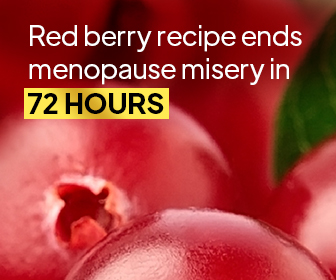Trouble getting to sleep? Dry hair and skin? Weakness? Sudden weight gain or loss? The symptoms of the most common thyroid problems can be nightmarish. What’s more, if you have no idea why these things are happening to you, it could be seriously scary. When you start to experience all or some of the above, it could be worth looking into thyroid disease.
Around 20 million Americans have some form of thyroid disease, according to Cleveland Clinic.[1] However, despite how prevalent this medical issue is, up to 60% of suffers are unaware that they have the issue.[2] If you’re worried about this issue and want to know more about how it could affect you and your health, you’ve come to the right place.
Within this comprehensive guide, we will be looking at the major symptoms of thyroid problems, how you can get a diagnosis, and what treatment is available. Here’s what you need to know.
What is Your Thyroid?
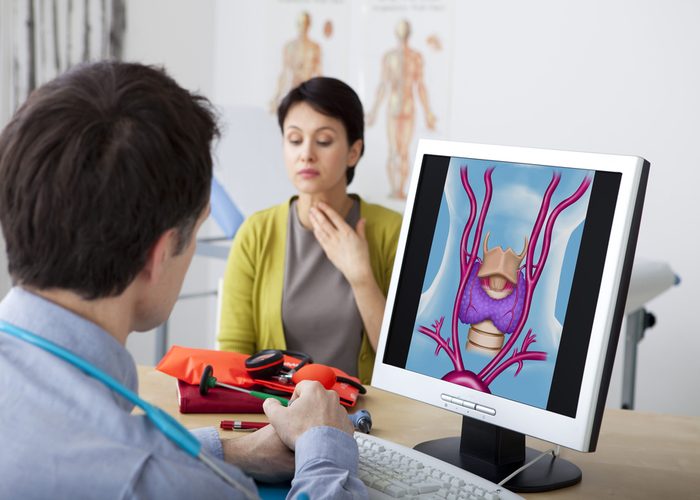
First of all, let’s go over the basics — what is your thyroid? If you’ve never encountered any issues with this area of your body, you may have no idea what it is. Put simply, your thyroid is a tiny, butterfly-shaped gland. Despite the fact that it’s a small gland, it actually plays a rather large role in your health and body.
One of the major roles of this gland is to produce the hormones your body needs to keep your metabolism working correctly. Your pituitary gland, which can be found in your skull, controls how much hormone the thyroid gland releases. These hormones are called T3 and T4 hormones and let your cell tissue know how much energy should be used.[3]
Fact: Did you know your thyroid helps your metabolism to work correctly?[4]
When your thyroid works properly, you should find that your metabolism ticks over well and you are healthy. However, if you’re suffering from a form of thyroid disease, you could find that it directly impacts your metabolism, how fast your heart beats, and how many calories your body burns on a day-to-day basis.[5] Needless to say, thyroid problems can be a massive hindrance and are something that you should get checked out as soon as possible.
Where is Your Thyroid?
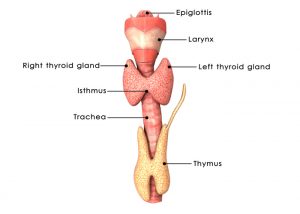
Now that you understand briefly what your thyroid does, you may be wondering one more thing: where is your thyroid? It makes sense that you would wonder where it is, as you won’t notice this small but vital gland unless it becomes enlarged due to thyroid problems.
The thyroid butterfly-shaped gland is found at the bottom of your neck and sits in the middle of the area. Usually, this gland works perfectly well and you won’t need to worry about it. However, when you start to suffer from some of the most common types of thyroid disease, you should seek medical attention as soon as possible.
Did you know?: Some people have found switching to the AIP diet to be beneficial to managing their autoimmune problems.
Thyroid Problems: The Thyroid Symptoms in Women You Need to Know
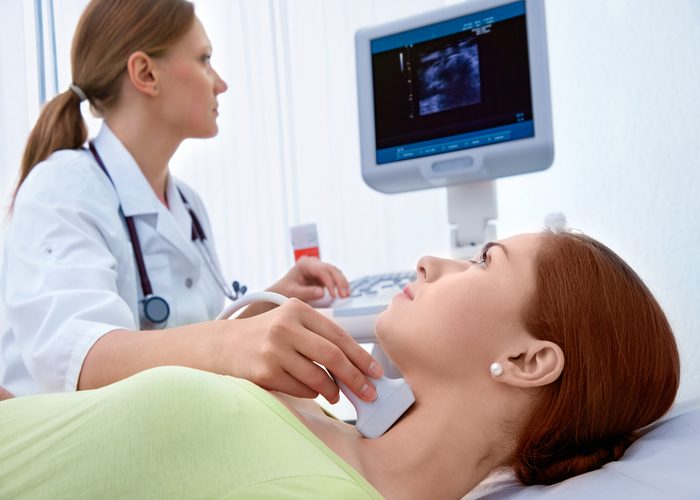
If you are worried about the possibility of thyroid problems, the good news is that most forms of thyroid disease can be managed easily with medical help.[6] The causes of some of the most common thyroid problems are actually unknown. More research is needed to fully understand what prevents this gland from functioning well in so many cases. However, it is clear that certain sectors of the population are more at risk than others.
Women are between five to eight times more likely to be affected by thyroid problems than men, according to the American Thyroid Association (ATA).[7] What’s more, the ATA also states that around one in eight women will develop thyroid problems at some point in their life.
For that reason, it’s absolutely crucial that you’re aware of the major thyroid symptoms and how the illnesses can be treated should they arise. Let’s take a look at some of the main forms of thyroid disease and find out what you need to know about each of them.
Hyperthyroidism

Hyperthyroidism is the term given when you have an overactive thyroid, i.e. the gland produces too much of the hormones that your body needs. This type of thyroid disease is often characterized by extremely high levels of thyroxine and low levels of TSH hormones.
Unsurprisingly, when your body starts to release too many hormones, you will encounter a wide range of medical problems that can have a serious impact if you don’t get medical help. While these types of thyroid disease can affect anybody, they are ten times more likely in women than they are men, according to the NHS.[8] You’re most at risk when you’re between the ages of 20 and 40, so it’s worth understanding the thyroid symptoms.
Symptoms
- Anxiety, fear, and worry
- Trouble getting to sleep
- Unexpected mood swings
- Swelling of the neck
- Tiredness and weakness
- Weight loss
- Trembling and twitching
Treatment
Should you experience a combination of these thyroid symptoms, the best course of action is to seek medical help. The thyroid treatment that you get from your doctor will largely depend on the severity of your particular condition. Common treatments include medication that will help to prevent your thyroid from over-producing hormones and radioiodine treatment, which uses radiation to curb your gland’s ability to make hormones.
In some cases, your doctor may recommend a course of surgery to either remove all or a part of your thyroid gland. This procedure will mean that your thyroid can no longer produce the high levels of hormones that it was previously releasing. You should discuss the various options with a medical professional to determine which is right for you.
Hypothyroidism
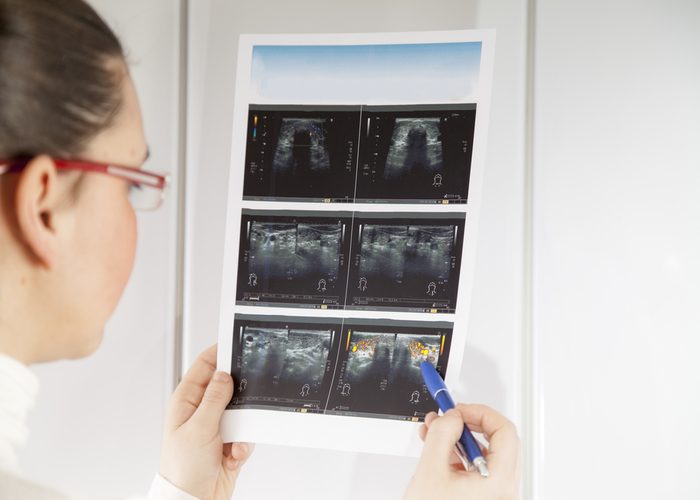
Essentially, hypothyroidism is the opposite of hyperthyroidism. This name is given to a range of thyroid problems, which mean that your gland is not able to produce as many hormones as your body needs to maintain a regular metabolism. Experts believe that this type of condition can be caused by your immune system attacking your thyroid gland or damage to the gland as a result of other procedures.[9]
Sadly, that means that there is nothing that you or your doctor can do to prevent this issue from rearing its ugly head. Both men and women can be diagnosed with hypothyroidism, however, it is a thyroid disease that is more common in women.[10] It should be noted that children can experience this problem too and, in some cases, babies are born already having the thyroid problem.
When you have been diagnosed with hypothyroidism, there are some simple ways in which you can manage the condition. If you’re worried that you may have an underactive thyroid gland, it’s worth taking a quick look at these thyroid conditions and demystifying the symptoms you may encounter.
Symptoms
- Weight gain
- Depression/long periods of sadness
- Tiredness
- Feeling cold all the time
- Muscular aches and pains
- Dry skin
- Dry hair
Treatment
Leaving these types of thyroid disease untreated can be dangerous. In severe cases, an untreated case may lead to pregnancy problems, heart disease, and a myxoedema coma.[11] To find out whether you’re suffering from hypothyroidism, your doctor will send you for a blood test.
The most common type of thyroid treatment here is a daily hormone tablet, which will help to replace the thyroid gland hormones that your body lacks. Much of the time, you will need to take these tablets for the rest of your life. However, they should not impact you in any negative way and will solve the problem.
Fact: Untreated cases of hypothyroidism can lead to pregnancy problems and other health concerns.[12]
So long as you’re taking the right amount of the hormone replacement tablets, you should not experience any side effects. However, if you begin to take too much of this medication, you could find that you suffer from headaches, chest pain, diarrhea, and vomiting.[13]
Hashimoto’s disease
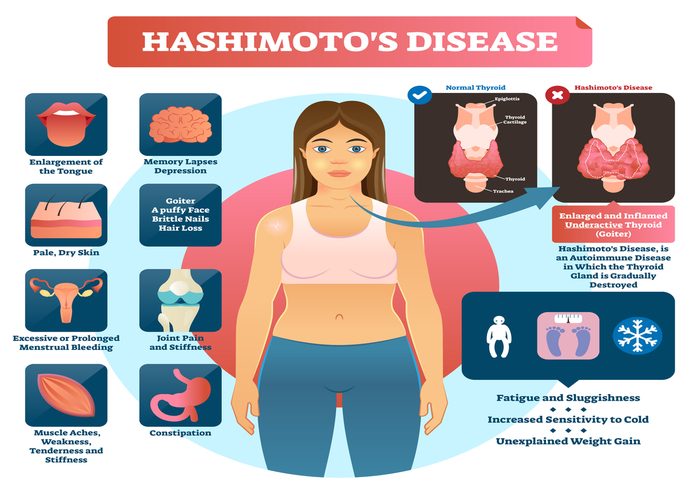
Also known as thyroiditis, Hashimoto’s disease occurs when your thyroid gland swells. The swelling affects the levels of hormones that get released into your body from the gland. The main cause of Hashimoto’s disease is the immune system attacking your thyroid gland. This issue causing your gland to swell and, of course, it becomes damaged over time.
Those most common group at risk are women between the ages of 30 and 50.[14] Plus, it’s worth understanding that it can also run in families. So, if someone in your family has suffered from Hashimoto’s disease, you should keep a close eye on the area. You may want to increase the number of checkups you have, for example.
The condition progresses slowly, which means that it is often hard to detect. The thyroid symptoms that you will experience here are extremely similar to that of hypothyroidism. That means that you may easily confuse the two conditions at first glance. You need to head to the doctor to get properly diagnosed, in that case.
Symptoms
- Weight gain
- Tiredness
- Dry skin
Treatment
Unfortunately, there is no cure for Hashimoto’s disease. However, there are ways in which you can easily manage the problem. You may treat the problem in the same way that you would hypothyroidism — by taking regular hormone supplements. If a goiter (i.e. a lump) forms in your throat as a result of your condition, you may need to have surgery. You may also need an operation if there is a chance that the condition will turn cancerous.
Thyroid Cancer
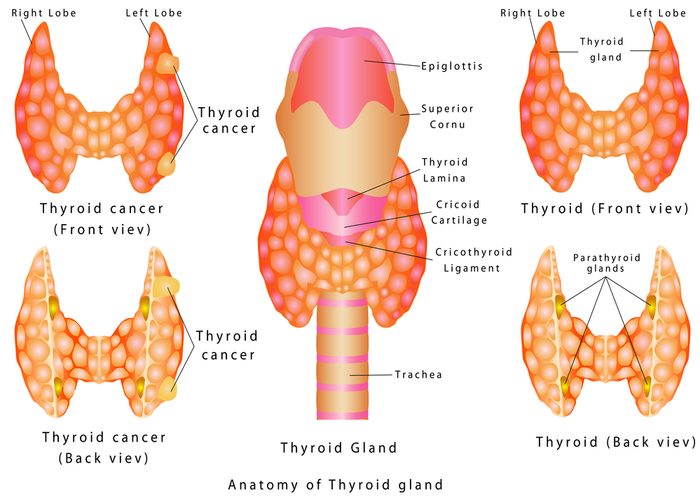
In some rare cases, the thyroid gland can become cancerous. This is usually categorized by a hard and painful lump forming on the gland itself. Most of the time, this type of cancer can be treated safely with medical attention and help. However, it is important that you get regular checkups to make sure that the cancer does not return after treatment.
The chances of you having thyroid cancer are slim. Only one in 20 lumps in the neck turn out to be cancerous.[15] However, women are three times more likely than men to be diagnosed with this type of condition. You are most at risk during your 30s or after the age of 60. For that reason, it’s worth educating yourself on the matter and the symptoms.
Symptoms
- Firm, growing lump in the neck
- Difficulty swallowing
- Swelling in the glands
- Pain in the neck area
- Ongoing sore throat
- Breathing problems
- Horse throat
Treatment
Your doctor will be able to advise you on what the best course of treatment is for you. The thyroid treatment you receive will depend on how far the cancer has spread and how severe it is right now. In some cases, you might have surgery to remove the thyroid or part of it. Another common treatment is radioactive iodine treatment, in which you swallow a substance which can kill cancerous cells.
In more extreme cases, you may have to undergo chemotherapy or radiotherapy. Of course, you should discuss your options with your doctor in depth before you determine which is right for you. When you have finished your treatment, you will still need to follow up with your doctor on a regular basis to make sure the cancer does not return.
Thyroid Nodules
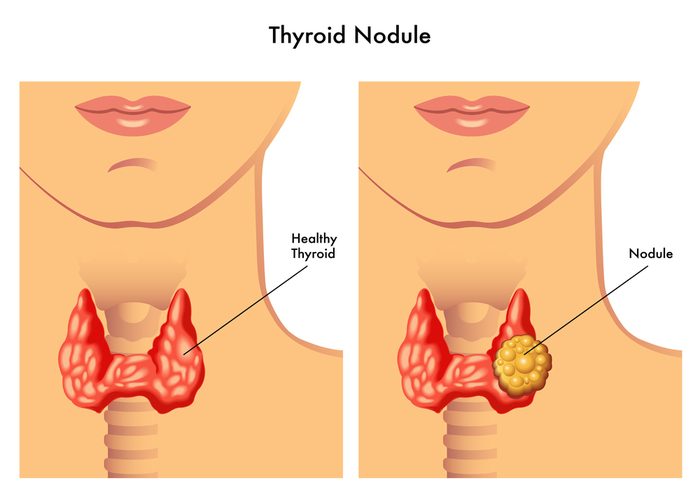
Perhaps one of the most common types of thyroid disease, thyroid nodules will affect half of Americans over the age of 60.[16] The nodules could be associated with both hypothyroidism and hyperthyroidism. Your doctor will need to examine the area and perhaps run some tests to determine what type of nodules you have.
You may have a thyroid ultrasound or even a biopsy as part of the testing phase. The tests will determine whether your thyroid nodules are cancerous or not. However, it’s worth remembering that a massive 90% of thyroid nodules are benign, according to the American Thyroid Association.[17] Again, your doctor will go through all of the possible outcomes with you and explain what you can expect during the tests.
Symptoms
Much of the time thyroid nodules don’t have any symptoms at all. Your doctor may discover that you are suffering from these thyroid problems as part of your routine checkup. For that reason, it’s essential that you have regular visits.
Treatment
If the thyroid nodules are cancerous or carry a high risk of becoming cancerous, the most likely form of treatment will be surgery. In most cases, that means that a specialist surgeon will remove your thyroid gland or part of it. It’s important to note that most thyroid cancer is not life-threatening and can be treated safely with medical attention.[18]
Should you find that the thyroid nodules are benign (i.e. not cancerous), there are two possible courses of action. Your doctor may still recommend that you have surgery to remove part or all of your thyroid gland. However, in most cases, you will find that they advise regular ultrasound examines every six months to a year.
Grave’s Disease

Grave’s disease is one of the most common autoimmune diseases that you can have. Needless to say, your immune system is supposed to protect your body from any viruses, infections, or incoming bacteria. When it functions well, it can keep you safe and stop you from getting sick. However, Grave’s disease happens when the immune system starts to make antibodies that interact and react badly with the cells in our body.[19]
When you’re suffering from Grave’s disease, the antibodies that your body produces start to make your cells work more than they should do. This type of thyroid disease can quickly lead to the condition we covered earlier, known as hyperthyroidism. The sooner you find out about your condition, the sooner you can do something about it.
Fact: Did you know that only 1% of the American population suffer from Grave’s disease?
Interestingly enough, this particular type of thyroid disease is one of the rarest, with only around 1% of the American population suffering from it.[20] Of course, if you’re worried that you may have it, you need to consult with a doctor sooner rather than later. They will be able to diagnose the problem and let you know what the best course of action is.
Symptoms
- Fast heartbeat
- Weight loss
- Trouble sleeping
- An intolerance to sleep
Treatment
There are a few different options when it comes to treating Grave’s disease. In most cases, you will find that the doctor prescribes you some antithyroid drugs. Antithyroid drugs help to reduce T4 and T3 levels. The chances are that you will have to take the medication on a daily basis. If you are pregnant when you’re diagnosed, the doctor may prescribe you alternative drugs as the standard ones could affect your unborn child.
Other options include radioactive iodine and thyroid surgery. The radioactive iodine option involves consuming a substance that will get rid of the harmful cells. If your doctor believes that the best course of action is surgery, a specialist will remove part of all of your thyroid gland. You should take the time to fully understand your options and as your doctor questions before moving forward with your thyroid treatment.
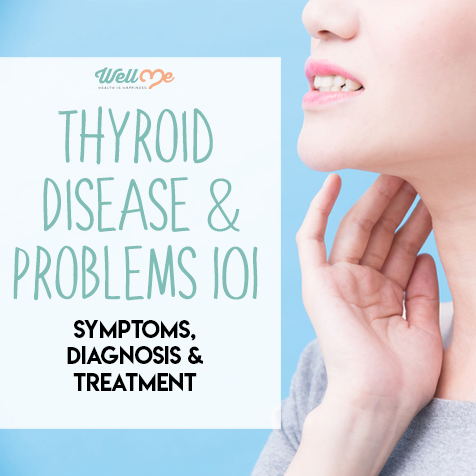
Conclusion
Thyroid disease and other thyroid problems are strikingly common, especially among women. By staying as vigilant as possible and looking out for the major thyroid symptoms, you can start to protect your health. Within this guide, you should have learned about some of the major conditions and how to spot them quickly and easily.
If you’re at all concerned about your health, it’s worth
taking a trip to the doctors and having a checkup. Taking care of your health
means continuously checking in with a medical professional and ensuring that
nothing is awry. Luckily, most thyroid problems are entirely curable and, with
the right care and attention, should not hinder your daily life.
References
- [1] https://my.clevelandclinic.org/health/diseases/8541-thyroid-disease
- [2] https://www.thyroid.org/media-main/press-room/
- [3] https://www.ncbi.nlm.nih.gov/books/NBK279388
- [4] https://www.ncbi.nlm.nih.gov/books/NBK279388
- [5] https://www.ncbi.nlm.nih.gov/books/NBK279388
- [6] https://www.thyroid.org/media-main/press-room
- [7] https://www.thyroid.org/media-main/press-room
- [8] https://www.nhs.uk/conditions/overactive-thyroid-hyperthyroidism
- [9] https://www.nhs.uk/conditions/underactive-thyroid-hypothyroidism
- [10] https://www.nhs.uk/conditions/underactive-thyroid-hypothyroidism
- [11] https://www.nhs.uk/conditions/underactive-thyroid-hypothyroidism
- [12] https://www.nhs.uk/conditions/underactive-thyroid-hypothyroidism
- [13] https://www.nhs.uk/conditions/underactive-thyroid-hypothyroidism/treatment
- [14] https://www.nhs.uk/conditions/thyroiditis/
- [15] https://www.nhs.uk/conditions/thyroid-cancer
- [16] https://www.thyroid.org/thyroid-nodules
- [17] https://www.thyroid.org/thyroid-nodules
- [18] https://www.thyroid.org/thyroid-cancer
- [19] https://www.thyroid.org/graves-disease
- [20] https://www.thyroid.org/media-main/press-room


